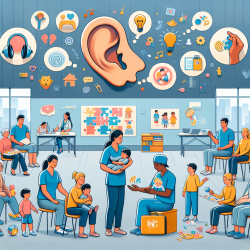The World Health Organization’s Caregiver Skills Training Program (WHO-CST) has demonstrated promising results in supporting families with children who have autism and developmental disorders or delays. The program was adapted and pre-pilot tested in Hong Kong to assess its feasibility and acceptability in a high-income, metropolitan setting. This blog explores how practitioners can implement the outcomes of this research to improve their skills and create better outcomes for children.
Understanding the WHO-CST Program
The WHO-CST program is a task-sharing, parent-mediated intervention designed to enhance caregivers' abilities to support their children’s learning, social communication, and adaptive behavior. The program consists of nine group sessions and three home visits, focusing on shared activities through play between caregivers and children.
Key Findings from the Hong Kong Adaptation
The adaptation of WHO-CST in Hong Kong involved a rigorous three-phase process: adaptation, pre-pilot, and pilot testing. Here are some key findings from the adaptation and pre-pilot phases:
- Acceptability: The program was well-received by caregivers and stakeholders. The inclusive nature of the program addressed the diverse needs of families, especially those awaiting formal diagnoses.
- Feasibility: The program was deemed feasible for implementation in Hong Kong’s busy metropolitan environment. However, the home visit component required careful planning due to privacy concerns.
- Training and Supervision: Ongoing training and supervision for master trainers (MTs) and facilitators were crucial for maintaining the program’s credibility and effectiveness.
Recommendations for Practitioners
Practitioners looking to implement or improve their skills using the WHO-CST program can consider the following recommendations:
- Emphasize Cultural Adaptation: Ensure that the program materials and delivery methods are culturally relevant and acceptable to the local community. This may involve translating materials and incorporating local examples.
- Focus on Practical Application: Caregivers valued practical strategies that they could implement in daily routines. Emphasize hands-on practice and real-life applications during training sessions.
- Utilize Technology: Use technology to support training and supervision. This can include video recordings for fidelity assessments and online training modules to accommodate busy schedules.
- Engage the Community: Collaborate with local stakeholders, including schools, social services, and healthcare providers, to promote the program and recruit participants.
- Provide Ongoing Support: Offer follow-up support through phone calls, apps, or online platforms to help caregivers sustain the skills learned during the program.
Encouraging Further Research
While the initial findings from the Hong Kong adaptation of WHO-CST are promising, further research is needed to assess the long-term effectiveness and scalability of the program. Practitioners are encouraged to participate in or conduct additional studies to explore the program’s impact in different settings and populations.
To read the original research paper, please follow this link: Adapting and pretesting the World Health Organization’s Caregiver Skills Training Program for children with autism and developmental disorders or delays in Hong Kong.










